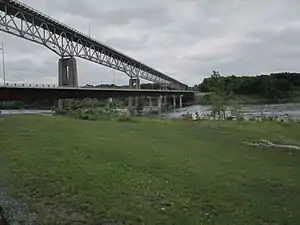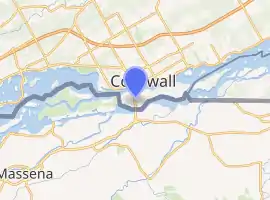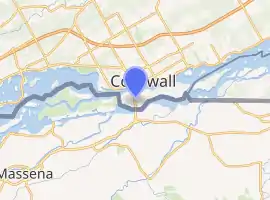Seaway International Bridge
The Seaway International Bridge is an international crossing connecting New York State, in the United States, and the province of Ontario in Canada. It consists of the South and North Channel Bridges. The South Channel Bridge was opened in 1958, and spans the St. Lawrence Seaway. The North Channel Bridge, opened in 2014, connects the City of Cornwall to Cornwall Island.
North Channel Span of Seaway International Bridge | |
|---|---|
 | |
| Coordinates | 45.00°N 74.74°W |
| Carries | Two lanes of traffic |
| Crosses | Saint Lawrence River |
| Locale | Cornwall, Ontario |
| Maintained by | Seaway International Bridge Corporation |
| Characteristics | |
| Design | Plate girder bridge |
| Total length | 1,652 m (5,420 ft) |
| Width | 8.2 m (27 ft) |
| Height | 15ft. 6inc. |
| Load limit | 115,000lbs |
| History | |
| Opened | 2014 |
| Statistics | |
| Daily traffic | 7,000–9,000 Cars Daily |
| Toll | $3.75 CDN/$3.00 USD |
| Location | |

| |
South Channel Bridge of Three Nations Crossing | |
|---|---|
| Coordinates | 45°00′N 74°44′W |
| Carries | Two Lanes of Traffic |
| Crosses | Saint Lawrence River |
| Locale | Cornwall, Ontario/Massena, New York |
| Maintained by | Seaway International Bridge Corporation |
| Characteristics | |
| Design | Suspension bridge |
| Total length | 1,060 m (3,480 ft) |
| Width | 8.2 m (27 ft) |
| Height | unknown |
| Longest span | 275 m (902 ft) |
| Load limit | 115,000lbs |
| Clearance above | 35.5 m (116 ft) |
| History | |
| Designer | Hugh and Philip Louis Pratley |
| Opened | 1958 |
| Statistics | |
| Daily traffic | 7,000–9,000 Cars Daily |
| Location | |

| |
The bridge is among the busiest on the Canada–United States border in the state of New York, with about two million crossings a year.[1] It is jointly owned by the Federal Bridge Corporation (a Crown corporation of the Canadian federal government) and the Saint Lawrence Seaway Development Corporation (an agency of the United States Department of Transportation), and is operated by the Seaway International Bridge Corporation, which came under the control of the Federal Bridge Corporation from the Saint Lawrence Seaway Authority in 1998.
Previously known as the Cornwall-Massena International Bridge, the SIBC was a private bridge whose outstanding stock was purchased by the Saint Lawrence Seaway Authority (Canada) and the Saint Lawrence Seaway Development Corporation (U.S.) in 1957. It was incorporated in Canada five years later.
In 2000, the international border crossing that the Seaway International Bridge comprises was named the Three Nations Crossing, in honor of the Mohawks of Akwesasne who inhabit the region.
On January 24, 2014, the opening of a new lower-level bridge marked the official closing of the former high-level North Channel crossing of the Seaway International Bridge. This project was estimated to cost $75 million, entirely funded by the Government of Canada. It was announced in 2010 that the Government of Canada would be going forward with this project that would involve the construction of a new low-level bridge as well as the demolition of the Seaway International Bridge to ensure the longevity of the border crossing, assuring that the former bridge was still in safe driving condition. The high-level Seaway International Bridge was completely demolished in 2015.[2] At the opening ceremony of the new bridge, the first person to make the crossing was Raymonde Champagne, who had also been the first person to cross the high-level bridge in 1962.[3]
Border crossing
The Three Nations Crossing is the border crossing associated with the Seaway International Bridge. It was named in 2000, in honor of the Mohawk of Akwesasne, a federally recognized tribe in the United States and First Nation in Canada. Their reserve extends across the international border, in addition to that between Quebec and Ontario. Most of the land is in New York, United States.
References
- "Chapter 4: The Watery Boundary". United Divide: A Linear Portrait of the USA/Canada Border. The Center for Land Use Interpretation. Winter 2015.
- "New Bridge in Cornwall — News". Cornwallseawaynews.com. 2010-08-10. Archived from the original on 2014-03-19. Retrieved 2015-06-03.
- "Opening of low-level bridge marks new era - News". Cornwallseawaynews.com. 2014-01-24. Retrieved 2015-06-03.